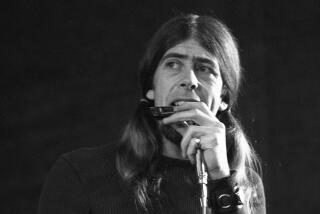A Chance to Spread the Blues From Coast to Coast
- Share via
When Bubba Jackson heard about satellite radio, he knew that he had found a home. The jovial, longtime Los Angeles music figure--among other things, a disc jockey at former R&B; station KACE-FM (103.9) and long-time jazz station KLON-FM (88.1), the producer of three different blues festivals and the artistic director of the Central Avenue Jazz Festival--quickly realized that his far-ranging career had provided precisely the right qualifications for the new medium.
“When I looked at what they were doing in terms of radio,” says Jackson, “I knew that it was truly the next generation, that it was once again putting radio back in the hands of people who love radio, instead of the absentee landlords who have been controlling it for the past decade or so, interested only in the bottom line.”
A few weeks ago, XM Satellite Radio offered Jackson the opportunity to participate directly in the process by naming him program director for the service’s Bluesville Channel. The company is one of the major players in the rush to provide national radio programming through signals beamed directly to individual subscribers (at a cost of $9.95 a month). The signals will be accessible--via new receivers (or adapters)--in most areas of the contiguous 48 states.
When XM begins service sometime in the first half of 2001 (the first satellite is scheduled to be launched in December), the most immediate appeal, presumably, will be to travelers who no longer have to continually adjust stations or endure long stretches of hard-to-take programming. But Lee Abrams, XM’s chief programming officer, wants the company’s offerings to be diverse and appealing enough to become a staple of home listening, as well.
“We’re going to have 50 channels of music,” says Abrams, “probably two-thirds of it some sort of pop related music--but totally rethought. We’re burning the playbook and starting over. It’s reminiscent of the exciting things we were doing in the early days of FM. And, in addition, we’ll have channels devoted to genres that have never been heard on radio in their own niche--whether it’s blues or reggae or heavy metal.”
Jackson is similarly enthusiastic about the potential of satellite radio, which he compares to the arrival of cable television.
“When cable first came, it was originally for places that couldn’t get television any other way,” he says. “Well, I’m from New York City, and I was 21 years old before I realized you could watch television without seeing snow on the screen. Then I went to Texas, saw cable television and thought, ‘Man this is like going to the movies.’ ”
But Jackson is excited about much more than the clear, national radio signal that XM Radio Satellite says it will provide.
“The commercial radio that we have now is so structured and predictable that it’s boring,” he says. “It’s the reason why people surf from station to station, because there’s no excitement in it. But radio is a very personal medium, because so often it’s with you when you’re in your car or when no one else is around. I think that interaction has suffered because the fun is gone in local radio, in part because of the playlists, and especially because of the suppression of creativity and personality.”
Indeed, Abrams wants to offer programming in which there is an almost synergistic link between the music and the disk jockey.
“Our mission is to totally reinvent the way radio sounds both musically and between the songs,” Abrams says. “We have two types of stations in that sense. The first is in-your-face stations. . . . Then there are the very ethereal, very heady stations--many of our jazz and New Age stations, our eclectic album rock stations.”
In the case of the Bluesville Channel, the between-songs segments will be handled by Jackson and music director Bill Wax (with other on-air talent to be added later). And the warm and witty personality that has made KPCC-FM’s (89.3) pledge drives tolerable will undoubtedly be in the foreground when Jackson works with the blues.
Wide Background in Gospel, Blues, Jazz
Born in Harlem, his lengthy career (he began in radio sales in 1970) has included hosting gospel, blues and jazz radio shows, as well as a pair of television variety shows, in Denver and Los Angeles. As the founder of Radio & Music Productions in Long Beach, he has produced Shriners educational fund-raisers in Los Angeles, St. Louis and New Orleans, and kicked off the L.A. BLUES4U Festival this year.
Jackson moved to the Washington, D.C., area (home base for XM Radio) a few weeks ago with his two cats, Miles Davis and Nina Simone. The father of a daughter, he has four grandchildren and has been known simply as “Bubba” for more than 30 years. “That’s it,” he says with a chuckle, “that’s my name. Just ‘Bubba.’ ”
Under Jackson’s direction, the Bluesville Channel will encompass every aspect of the blues, from Robert Johnson to Eric Clapton, with all stops in between.
“I’m going to take advantage of the opportunity to explore the envelope of the music,” he says. “Bessie Smith, for example, is going to have a regular place, she’s not just to be thrown in on occasion. Because this will be a channel for the blues, by the people who make the music, for the people who love the music. Everything that’s involved with it is going to be the blues.
“That means people like Muddy Waters, Luther Allison, Johnny Taylor, Johnny Otis and, Jimmy Witherspoon. Lots of Lightnin’ Hopkins, because I think he was one of the great poets of the blues, and I think he carried a true African heritage in his music, talking about what was happening in his country like an African griot telling stories. And Freddy King, Albert King and B.B. King, Stevie Ray Vaughan, Eric Clapton. We’ll celebrate the different regions of the blues--the Delta, Chicago, Texas, Kansas City--and, of course, we’re going to celebrate West Coast blues, as well. The Stax sound, R&B;, Louis Jordan and the jump bands. It’ll all be there.”
Jackson’s effort to “explore the envelope” is based on his desire to reveal the music’s great breadth, to validate it as an artistic expression that reaches well beyond the usual image of the blues as downbeat music.
“Whenever I’ve gone to a blues festival or produced a blues festival, I haven’t seen people who are sad,” he says. “I’ve seen people dancing, laughing, eating, being happy. One of things I’ll never forget is a picture that someone took at the blues festival in Long Beach--a picture of a little 7- or 8-year-old kid playing the greatest air guitar you have ever seen. The ecstatic expression on his face, his body language, everything, said, ‘This is me.’ When I saw that photo, I thought, man, if this is the blues, then I want to have the blues.”
And the Bluesville Channel, for Jackson, will belong to those who have similar feelings.
“The folks who have been going to blues festivals and listening to the blues for 30 and 40 years know more than I do,” he says. “I learn from them, and one of the things I’ve learned is that they really care about this music. XM Satellite Radio is giving me the opportunity to reach them with the blues on a one-on-one basis.
“All this technology, this next generation of radio, is basically allowing me to get in front of a microphone and work for one person--the person who is listening.”
More to Read
The biggest entertainment stories
Get our big stories about Hollywood, film, television, music, arts, culture and more right in your inbox as soon as they publish.
You may occasionally receive promotional content from the Los Angeles Times.









